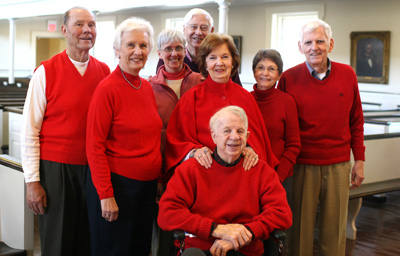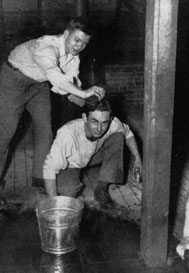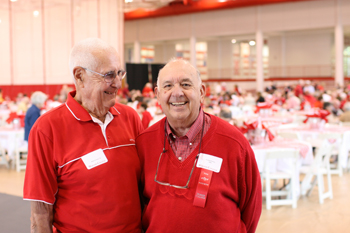 Paul Jones ’51 lost both his parents when he was a student at Wabash.
Paul Jones ’51 lost both his parents when he was a student at Wabash.
“My father died unexpectedly during surgery, and my mother died less than a year later,” Jones recalls. His roommate and Phi Psi fraternity brother Dick Griesser ’51 delivered the news.
“We had only one telephone in the fraternity house and I was the one who got the call. I had to go tell him what had happened,” Griesser remembers. “You want to hear that kind of thing from a friend, not a stranger.”
“That was a hard time,” Jones admits. “I was just thankful to make it through.”
Griesser drove his friend home for the services.
“He was real good about that. He had a big Buick convertible.” Jones manages a smile. “It was a sad trip, but a comfortable one. It was good to have a friend around. All the guys were good to me.”
“All the guys” were Jones’ Phi Psi brothers—charter members of the newly reactivated Gamma Chapter at Wabash. Jones was among 26 students hand-picked by Dean Byron Trippet ’30 in 1947 to re-establish the fraternity.
Sixty-two years later the guys continue to be good to Jones—and to each other. A faithful group of the founding brothers of Phi Psi have returned to campus for Home-coming every year for the past four decades, affirming and celebrating their friendship, bringing their wives and families into the circle, and remembering those they’ve lost.
Theirs is the story of how a fraternity was built, what Wabash friendships can mean, and how they can endure for a lifetime.
Growing Up at Wabash Together
“A lot of people ask, ‘You do that every year?’ I say, of course.”
Paula Jackson is talking about the Phi Psi brothers’ annual gathering during Homecoming that she attends with her husband, Warren, the fraternity’s first president. “I came in as a wife when we started getting together in the 1970s. It’s great to see everyone again. It’s something we look forward to—not just getting together, but being at Wabash and catching up.”
Asked what first forged such strong bonds between her husband and his friends, she says, “Well, the guys did a lot of work on that house together.”
“That house” was the former residence of the Ristine family on Grant Avenue, purchased as the new fraternity’s first home.
“The house was our life for a time there,” Warren Jackson says.
“It wasn’t a fancy place, but we were thrilled to have anything we could,” says Griesser.
“It was an old gingerbread style, really something,” Jackson remembers. “But the house was a wreck.”
A contractor refurbished the plumbing to fraternity specs and added a kitchen and dining room to the basement. But there was plenty of labor left for the students.
“We spent about a week down in the basement scrubbing the floor where there’d been an old coal bin,” Jackson says. “Dave Randolph’s mom gave us a TV set, someone else’s mom gave us couches—that’s how we furnished the house, with donated items from our families.
“We had two living rooms, a den, and a hallway that needed painting, so we decided we’d paint them all in one weekend,” Griesser recalls. “We peeled off as many as seven layers of wallpaper in some of those rooms, patched up the plaster, and then we painted them. No professionals—just brothers and pledges working together. What an accomplishment—something I’ll never forget.”
As house manager, Griesser sat down with the cook and ordered the silverware and dishes for the fraternity.
“I’d never been involved with anything like that before, and all of the sudden I was just doing it,” Griesser says.
Although many of the Phi Psi founders had served in the military and were older than their classmates, Paul Jones says, “We all sort of grew up together at Wabash.”
“A great Wabash man”

None of this would have been possible without Eddie Knight, Wabash Class of 1893. An Indianapolis attorney and member of the original Phi Psi chapter which had voluntarily surrendered its charter in 1901, Knight had tried unsuccessfully to re-start the chapter in 1914. The influx of veterans after World War II and President Frank Sparks’ approach to campus life encouraged Knight to try again in 1947.
“Eddie talked to us about what great fun it would be to reactivate the chapter,” Jack-son says. “His speech was so great that he got us all enthused. He was a great Wabash man.”
But the group was apprehensive about traditional fraternity rites.
“We were older—most of us were veterans—and we weren’t going to put up with hazing,” Jackson says. “So we got the okay to do things our way.”
“I have a fraternity paddle on my wall from Gordon Peters and Brian Denney, but we didn’t have paddlings like other fraternities,” Griesser says.
The unconventional ap-proach attracted a different sort of student than was typical for fraternities in that day.
“We picked up guys from Kingery Hall, Hulet House, some from Kane House, and some living independently,” Jackson says. “They came from everywhere.
“Jimmy Ching was one of the original group, and he was a prize. Talented in every way—a brilliant scholar, an athlete, a fun guy. His mother lived in Hawaii, and in intramural football games Jimmy played end and ran barefoot. He was fast! I can still see him running up and down the field.
“He wrote our song, ‘The Sweetheart of Phi Kappa Psi,’ always led Chapel Sing, and helped us with other songs.”
In the summer of 1950, Ching and Griesser toured the West and Mexico in Ching’s old green Nash. Griesser still tells stories from that trip to the high school students he substitute-teaches these days.
Marsh “Bud” Jones was another atypical fraternity brother.
“He was about as independent a person as there was in the world,” Jackson says. “But he would come over and mow our lawn and he took a liking to the fact that we had our own rules. So he joined us.”
Bud Jones’ family lived near Crawfordsville, and his home became a social center.
“We’d go out there with our dates and Bud’s mother would be our hostess,” Jackson recalls.
Jones’ parents also ran the Crawford Hotel.
“But taking a date to the Crawford was like locking her up in jail—they were ready for us,” Griesser says, “We couldn’t get above the first floor. You could arrange for your date to have a room in someone’s home, but that didn’t do any good for any he’n and she’n either!”
Jones and his wife, Dorothy, weren’t among the original group returning annually for Homecoming, Jackson says, “but when they finally came, Bud was the life of the party.”
Don Martin from Mississippi, now a retired professor at Indiana University, was another charter member.
“He was always fun at our parties,” Griesser says. “He could play the guitar—‘That Good Ol’ Mountain Dew’—and has always been a super guy.”
Martin and his wife, Fran, continue to join the Jacksons, Griessers, Paul Jones and his wife, Mary, and the Morrises for the annual get-togethers.
 “They Never Let You Go”
“They Never Let You Go”
Warren Jackson left Wabash his junior year to get married. He went to work in Chicago, completing his degree at Northwestern.
“But I kept the friendships at Wabash going as best I could,” he says. Still, there was a time when he didn’t return for Homecoming.
“I’d go down there for football games, but my group was gone, and the house wasn’t much interested in us,” he explains.
So in the early 1970s the Jacksons, Morrises, and Joneses started their own Homecoming tradition. They would attend the football game, but they’d also take time to savor the memories stirred by their return to the campus. Today the tradition is spread out over three days, and several of the couples get together at other times of the year. In time more of the brothers and their wives joined in, including Griesser.
“I came back on my own in 1980 and I found these guys were coming back too,” he says. “Our wives have gotten to know each other, we’re involved in each other’s lives.”
In fact, Jackson says, “I think the ladies want to get together as much as we do. When we get together for our cocktail parties, they’re raising more hell than we are! The girls have formed wonderful friendships.
“We’ll all sit for hours and talk and laugh, tell stories, eat and drink. No one gets snockered. We just have a good time. We used to get the big table at the restaurant and drive the waitresses nuts.”
The years have taken their toll. Jimmy Ching earned his doctorate after Wabash and be-came a speech professor, but he died young of a heart attack before the annual gatherings began.
“That broke everybody’s heart,” Jacskon says. “He was very close to all of us.”
Just this year, Dick Griesser’s pledge son Gordon Peters died.
“We’ve lost Bud Jones, Bob North, Dick Regnier, now Gordon,” Jackson says. “We stay in touch with wives of the guys who have died. Just because one of us dies doesn’t mean our family is out of the group.”
Jackson recalls his own battle with cancer in 1970.
“I was living in Florida, and they still got in touch with me,” he says. “They never let you go.”
The Dean who in 1947 selected 26 students to form a new fraternity once wrote, “The intertwining of human lives is at the heart of the spell which a college like Wabash has repeatedly cast on a long succession of young men.” The friendships Byron Trippet began with that selection are fraternity in its richest sense, and an enduring legacy.
“It was a wonderful time for the country—the war was over and everyone was at peace with the world,” Warren Jackson says, “And it was a wonderful time of life for us. Our group just grew out of that.
“We’ve had illness over the years, but somehow we just work our way through it. It’s part of growing old, and that, too, has become something else that ties us together. We call each other often during the periods of turmoil.
“We’ll keep getting together until we drop. I know that one of us is going to be left by himself someday. But we’re grateful for the time we have had together. We truly enjoy each other.
“We’ve had wonderful times. And we weather the storm.”
 Paul Jones ’51 lost both his parents when he was a student at Wabash.
Paul Jones ’51 lost both his parents when he was a student at Wabash.  None of this would have been possible without Eddie Knight, Wabash Class of 1893. An Indianapolis attorney and member of the original Phi Psi chapter which had voluntarily surrendered its charter in 1901, Knight had tried unsuccessfully to re-start the chapter in 1914. The influx of veterans after World War II and President Frank Sparks’ approach to campus life encouraged Knight to try again in 1947.
None of this would have been possible without Eddie Knight, Wabash Class of 1893. An Indianapolis attorney and member of the original Phi Psi chapter which had voluntarily surrendered its charter in 1901, Knight had tried unsuccessfully to re-start the chapter in 1914. The influx of veterans after World War II and President Frank Sparks’ approach to campus life encouraged Knight to try again in 1947.  “They Never Let You Go”
“They Never Let You Go”